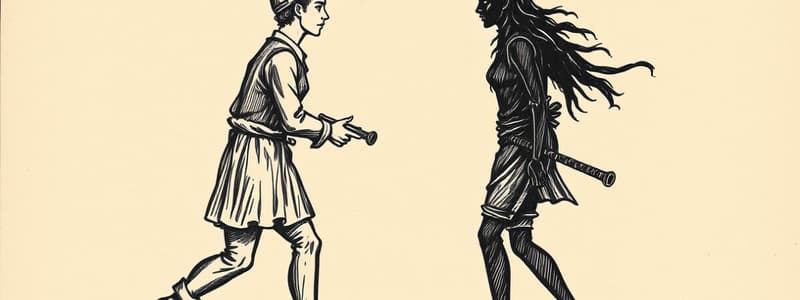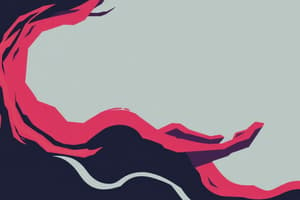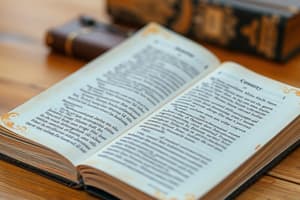Podcast
Questions and Answers
What type of conflict is represented by 'Person vs.Self'?
What type of conflict is represented by 'Person vs.Self'?
- A struggle between protagonist and society
- A struggle between protagonist and nature
- A struggle between protagonist and antagonist
- A struggle within the protagonist (correct)
What does 'Person vs.Person' refer to?
What does 'Person vs.Person' refer to?
- A struggle between protagonist and nature
- A struggle within the protagonist
- A struggle between protagonist and society
- A struggle between protagonist and antagonist (correct)
What type of conflict is 'Person vs.Nature'?
What type of conflict is 'Person vs.Nature'?
- A struggle between the protagonist and an internal force
- A struggle between the protagonist and another character
- A struggle between the protagonist and culture
- A struggle between the protagonist and a force of nature (correct)
What does 'Person vs.Society' mean?
What does 'Person vs.Society' mean?
What is the setting in a story?
What is the setting in a story?
What is a symbol in literature?
What is a symbol in literature?
What is foreshadowing?
What is foreshadowing?
What is the theme of a story?
What is the theme of a story?
What does mood refer to in literature?
What does mood refer to in literature?
What is tone in literature?
What is tone in literature?
Flashcards are hidden until you start studying
Study Notes
Conflict Types
- Person vs. Self: Represents an internal struggle within the protagonist, showcasing personal dilemmas and emotional turmoil.
- Person vs. Person: Involves a conflict between the protagonist and antagonist, often driving the plot through opposing goals or motivations.
- Person vs. Nature: Highlights the struggle between the protagonist and natural forces, emphasizing survival and the unpredictability of nature.
- Person vs. Society: Explores conflicts between the protagonist and societal norms or cultural expectations, often leading to themes of individualism and social criticism.
Literary Elements
- Setting: Refers to the specific time and place where the story unfolds, influencing the mood and character development.
- Symbol: An object that represents a broader concept or idea, enriching the narrative and adding layers of meaning.
- Foreshadowing: Involves hints or clues about future events in the story, creating anticipation and tension for the reader.
Themes and Emotions
- Theme: The underlying moral or lesson conveyed by the author, essential for understanding the story's deeper meaning.
- Mood: The emotional atmosphere created while reading, shaped by the author's word choice and style, affecting the reader's experience.
- Tone: Refers to the author's attitude expressed through writing, which influences how the reader perceives characters and events.
Studying That Suits You
Use AI to generate personalized quizzes and flashcards to suit your learning preferences.




